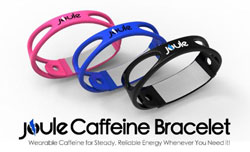A new transdermal bracelet called Joule Caffeine Bracelet administers caffeine directly into the body and lasts for about four hours.
Joule releases caffeine into the body via the skin of the wrist. Each caffeine patch, which is placed on the bracelet that presses against the wrist, is equivalent to one cup of coffee.
The product was conceived through an Indiegogo page, an online crowdfunding site that raises money for potential projects. On the site, users can describe their product and post a goal fund, the price they wish to reach, which is typically the price needed to make the products. Then, users that are interested in the product can donate money to the cause. The bracelet already raised about $40,000, which is substantially more than the stated goal of $15,000.
Amanda Sanford, a sophomore nursing student, said that although the product is innovative and ambitious, it is important to use it responsibly. “Overall I think it’s an interesting concept because people who don’t like coffee or other sources of caffeine can benefit, but on the other hand it could be considered feeding an addiction,” said Sanford. “I think it could be potentially very dangerous if abused and I personally would not use the caffeine patch. A cup of coffee is a lot more natural and much more enjoyable than something stuck to my arm.”
The product has received some criticism due to the fact that it eliminates the joy of sitting down and having a cup of coffee. Coffee has long been a form of convivial social interaction, as people typically meet with friends to socialize over a cup of coffee. To erase that function would be to change a very popular and long-standing aspect of society.
“It is definitely interesting,” said Suanne Schaad, Substance Abuse Coordinator. “I would mostly wonder how they are regulating the flow of caffeine. It is so new a device, there is not much known about it or its effects on users of the bracelet. With devices like this, I do wonder if people will wear several of the bracelets at once to get a stronger dose. It is recommended as adults we consume no more than 400 mg of caffeine a day. It does seem there could be a potential for overdose of caffeine.
However, Joule has also been praised for its positive attributes. Since it takes a few hours for the equivalent of one cup of coffee to enter your body, the bracelet won’t leave you with the jitters, and you will not crash hours later. Essentially, Joule administers the coffee at a rate that is comfortable for your body. When you consume coffee orally, there is a high possibility that it can be consumed too quickly, thus causing the body to go haywire. Now, the problem is solved through the time release aspect of Joule. Additionally, unpleasant side effects of coffee will be eliminated, such as the horrid coffee breath and unsightly yellow teeth stains. Moreover, it also cuts out the process of driving to a coffee shop and waiting in line. It is as simple as putting on a piece of jewelry.
John Feldmann, an adjunct professor in the Department of Political Science and Sociology and a frequent coffee drinkier, said that the bracelet makes caffeine into solely a medicinal purpose.
“There is a certain amount of nutritional value to coffee, so putting it into a bracelet eliminates the aspect of drinking it with friends, which is a form of social interaction, and it also transforms it into a medicine, as opposed to a beverage,” said Feldmann.
Kelly Faxon, a sophomore psychology student, said that the bracelet is unnecessary, as the current methods of caffeine work perfectly. “I wouldn’t use it. Caffeine does not really have an effect on me, however I do drink coffee every day and have experienced withdrawal type symptoms if I do not have caffeine for more than 24 hours,” said Faxon. “I believe it could be dangerous as students may overuse the patches; caffeine addiction and withdrawal are both very real medical issues. I’d say that it is unnecessary and has the capability of being dangerous. There are numerous sources of caffeine already available and there is a large possibility of misuse or overuse of the patches.”
Thousands of college students rely on coffee to get through the day. Whether staying up for class or staying up to pull all nighters and complete homework, coffee is used in college dorms throughout the nation. Therefore, it is important for students not to become over-enthusiastic with these bracelets and cause harm to themselves.
In concordance with Faxon, sophomore business student Caroline Alvarado said that the patches are not needed, as society is content with its current forms of getting caffeine.
“Overall, I feel that the creation of a caffeine patch is unnecessary for society’s needs. We already live in fast-paced world and the ease of putting on a patch as a substitute for consuming other caffeine items seems inessential,” said Alvarado. “Personally, I don’t see myself using the product because I don’t see it providing me with any additional value.”
Currently, one Joule bracelet, which comes in either pink, blue, or black, along with 30 caffeine patches is $29, which averages out to less than $1 a day for a cup of coffee.
IMAGE TAKEN from www.coolwearable.com


